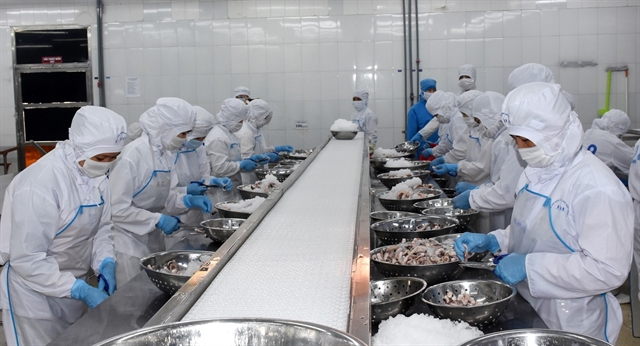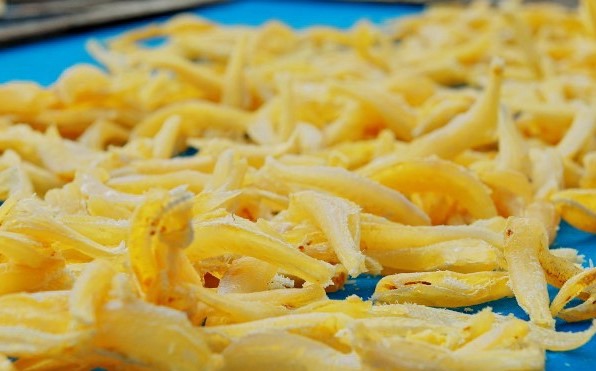 Economy
Economy


|
| Seafood processing plant of the Bà Rịa-Vũng Tàu Seafood Processing Import - Export JSC (Baseafood). — VNA/VNS Photo |
BÀ RỊA-VŨNG TÀU — In order to maintain production and business and create jobs for workers, export enterprises in the southern coastal province of Bà Rịa-Vũng Tàu are trying to find new orders, take advantage of free trade agreements (FTAs) in effect, and wait for a chance to recover in major markets.
The inflation rate is at a high level in many countries, causing a sharp decrease in the world’s aggregate demand, and directly affecting export activity.
To date, Việt Nam had signed a total of 16 FTAs with over 60 of the world's major markets.
Over the past four years, since the Comprehensive and Progressive Trans-Pacific Partnership (CPTPP), Việt Nam-EU Free Trade Agreement (EVFTA) and the UK-Việt Nam Free Trade Agreement (UKVFTA) took effect, the import-export turnover of enterprises in Bà Rịa-Vũng Tàu Province to the European and UK markets has increased by 75 to 300 per cent compared to before.
The Regional Comprehensive Economic Partnership (RCEP) alone, which went into effect in early 2022, has brought the export turnover of local enterprises to ASEAN countries to US$4.9 billion, accounting for nearly 60 per cent of the province’s total export turnover; and export turnover to countries outside the ASEAN region accounting for 30 per cent of the province’s total export value.
In particular, export turnover to the Australian market has increased nearly 200 per cent compared to previous years.
The province's major export items are crude oil, chemicals, iron and steel, plastics, fabrics of all kinds, fertilisers, machinery and equipment.
Trần Văn Dũng, chairman of the Board of Directors and general director of the Bà Rịa-Vũng Tàu Seafood Processing Import-Export JSC (Baseafood), said EVFTA has created favourable opportunities for local seafood products to enter the European market.
“This is one of the more difficult markets, with strict import regulations and standards for seafood products,” he said.
After Việt Nam signed this agreement, seafood products have entered more than 20 European countries very smoothly, he said.
Previously, the company exported about 5,500-6,000 tonnes of all kinds of seafood, with turnover of about $30 million.
Thanks to FTAs such as CPTPP, RCEP and EVFTA, the company’s exported seafood output increased to 7,000 tonnes with turnover of $45 million in 2021.
By October 2023, the company had exported 7,750 tonnes of all kinds of seafood, with turnover of $44.5 million.
“Besides proactively improving production quality and increasing the rate of deep processing to increase the value of their seafood products in the global market, local enterprises also take advantage of incentives of FTAs to expand markets,” Dũng added.
When agreements such as CPTPP, EVFTA, UKVFTA and RCEP took effect, they created new advantages for local businesses to increase exports to countries which are signatories of these agreements, including two traditional markets, Japan and Australia, with long-standing cooperation.
Nguyễn Văn Quý, deputy director of Vũng Tàu Imex Garment Joint Stock Company, said the RCEP has helped the country's textile and garment industry solve difficult problems related to rules of origin of raw materials.
Previously, Vietnamese apparel products exported to Japan had to comply with the rules of origin in the ASEAN-Japan Comprehensive Economic Partnership Agreement (AJCEP) and the Việt Nam-Japan Economic Partnership Agreement (VJEPA).
That means local textile and garment producers must use local materials for their products and the products must be made in Việt Nam.
However, with RCEP, Việt Nam now can import fabric and raw materials from anywhere, and just need to meet the made-in-Việt Nam requirement to enjoy tax incentives when exporting its products to Japan.
In addition, China is the leading country in supplying raw materials to many industries of Việt Nam, including the textile and garment industry, and is a member of RCEP.
Therefore, Việt Nam will receive tax exemption and reduction policies under RCEP when it uses raw materials imported from China for production and export of textile and garment products.

|
| The instant dried fish product of Baseafood exported to market. — VNA/VNS Photo |
Support policies
The province’s People’s Committee has approved a project that supports local enterprises in implementing EVFTA and other FTAs, with a number of solutions to support them in the international integration process.
It has issued a decision promulgating the plan to implement the Government ‘s resolution on improving the effectiveness of international economic integration and promoting economic development quickly and sustainable in the period 2023-30, including specific content related to the effective implementation of FTAs, especially new generation FTAs.
Vũ Bích Hảo, deputy director of the provincial Department of Industry and Trade, said in the coming time, the province will continue to strengthen support measures on improving competitiveness and developing brands for local industries and enterprises.
"It will also remove difficulties and obstacles in terms of policies on developing raw materials to reduce the dependence on imports, and take more advantage of FTAs," she said.
It will also continue to coordinate closely with the Ministry of Industry and Trade and trade counselors in key markets such as Europe to promptly inform local enterprises about foreign trade demands and promotion programmes.
That will help them promptly grasp information, and proactively have production and business plans to meet market requirements. — VNS




